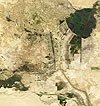The legendary Euphrates River has dwindled to perilously low levels in Iraq because of a severe two-year drought, the construction of dams in Turkey and Syria, and wasteful water management by the Iraqi government and farmers, the New York Times reports. The flow of the 1,730-mile river has been so sharply reduced that lakes and wetlands are drying up; rice, wheat, and barley farmers are unable to irrigate their fields; renowned Mesopotamia date crops are withering; and fishermen are losing their livelihoods. Unless the situation improves, the Euphrates’ flow could soon be only half that of several years ago, the Times reports. Particularly hard-hit are the marshes between the Tigris and Euphrates Rivers, which had been drained by Saddam Hussein but were on their way to being restored several years ago. Once again, however, many sections of marshland are dry. A major reason for the Euphrates’ reduced flow is the network of seven dams in Turkey and Syria, which limit the water downstream. Turkey has recently released more water into the Iraqi section of the river.
Euphrates River Dwindles Due to Dams and Long Drought
More From E360
-
WATER
After Ruining a Treasured Water Resource, Iran Is Drying Up
-
FILM
At a Marine Field Station, Rising Seas Force an Inevitable Retreat
-
Energy
To Feed Data Centers, Pennsylvania Faces a New Fracking Surge
-
SPACE
Scientists Warn of Emissions Risks from the Surge in Satellites
-
WILDLIFE
A Troubling Rise in the Grisly Trade of a Spectacular African Bird
-
MINING
In Myanmar, Illicit Rare Earth Mining Is Taking a Heavy Toll
-
INTERVIEW
How Batteries, Not Natural Gas, Can Power the Data Center Boom
-
ANALYSIS
As U.S. and E.U. Retreat on Climate, China Takes the Leadership Role
-
Solutions
From Ruins to Reuse: How Ukrainians Are Repurposing War Waste
-
ANALYSIS
Carbon Offsets Are Failing. Can a New Plan Save the Rainforests?
-
Energy
Facing a Hostile Administration, U.S. Offshore Wind Is in Retreat
-
Biodiversity
As Jaguars Recover, Will the Border Wall Block Their U.S. Return?
